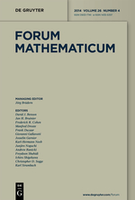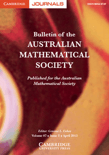
Aequationes Mathematicae
Scope & Guideline
Exploring the Depths of Discrete Mathematics and Combinatorics.
Introduction
Aims and Scopes
- Functional Equations:
The journal publishes research on functional equations, exploring their solutions, stability, and applications in various mathematical contexts. - Inequalities and Convexity:
A significant focus is on inequalities, particularly those involving convex functions and their generalizations, reflecting the journal's commitment to analysis and optimization. - Graph Theory and Combinatorics:
Research related to graph theory, including domination problems, spectral graph theory, and combinatorial structures, is a core area of interest. - Algebraic Structures:
The journal covers algebraic concepts, including semigroups, groups, and algebraic equations, emphasizing their applications in functional analysis and operator theory. - Geometry and Topology:
Papers on geometric properties, including convex bodies and spatial structures, are prevalent, showcasing the interplay between geometry and other mathematical domains. - Mathematical Modeling:
Research that applies mathematical theories to model real-world phenomena, particularly in functional analysis and differential equations, is also a prominent theme.
Trending and Emerging
- Stability of Functional Equations:
There is a growing trend towards studying the stability of various functional equations, indicating a shift towards understanding the robustness of mathematical models under perturbations. - Operator Theory and Functional Analysis:
Research in operator theory, particularly concerning functional equations in infinite-dimensional spaces, is increasingly prevalent, showcasing a modern approach to mathematical analysis. - Applications of Graph Theory:
An uptick in research applying graph theory to solve combinatorial and optimization problems reflects an emerging trend that highlights the practical relevance of theoretical mathematics. - Complex and Abstract Algebraic Structures:
There is an increasing interest in exploring complex algebraic structures, such as non-commutative algebras and their applications in functional equations, indicating a trend towards more abstract mathematics. - Interdisciplinary Approaches:
The journal is increasingly publishing papers that bridge mathematics with fields such as computer science and physics, reflecting a trend towards interdisciplinary research and applications.
Declining or Waning
- Classical Analysis:
There seems to be a declining focus on classical analysis topics such as basic calculus and elementary functions, as the journal shifts towards more abstract and generalized mathematical concepts. - Elementary Number Theory:
Papers specifically addressing classical number theory topics, such as prime distribution and elementary functions, are becoming less frequent, indicating a possible shift towards more advanced algebraic structures. - Discrete Mathematics:
While still relevant, the focus on discrete mathematics topics like basic combinatorial techniques appears to be waning, as the journal emphasizes more complex and abstract mathematical frameworks.
Similar Journals

COLLOQUIUM MATHEMATICUM
Engaging minds with groundbreaking mathematical concepts.COLLOQUIUM MATHEMATICUM, published by ARS POLONA-RUCH, serves as an essential platform for the dissemination of innovative research in the field of mathematics. With an ISSN of 0010-1354 and a dedicated E-ISSN of 1730-6302, this journal plays a crucial role in advancing mathematical knowledge and fostering collaboration within the academic community. Although it is categorized in the Q3 quartile for miscellaneous mathematics, its content consistently attracts a diverse readership, reflecting a wide array of mathematical disciplines. Spanning publication years from 2001 to 2009 and resuming from 2011 to the present, *COLLOQUIUM MATHEMATICUM* offers researchers, professionals, and students the unique opportunity to engage with groundbreaking concepts and methodologies. With its home base in Warsaw, Poland, this journal not only contributes to the regional mathematical landscape but also impacts the broader global community. While currently not adopting an open access model, the journal remains committed to quality research, evidenced by its Scopus ranking within the general mathematics category. Engage with *COLLOQUIUM MATHEMATICUM* to be at the forefront of mathematical exploration.

Revista Matematica Complutense
Cultivating Excellence in Mathematical ScholarshipRevista Matematica Complutense is a prestigious peer-reviewed journal published by SPRINGER-VERLAG ITALIA SRL, specializing in the field of mathematics. With its ISSN 1139-1138 and E-ISSN 1988-2807, the journal plays a vital role in disseminating high-quality research and fostering academic discussion within the mathematics community. Recognized for its rigorous selection process, the journal has achieved impressive rankings, holding a Q1 quartile status in the miscellaneous mathematics category as of 2023 and ranking #94 out of 399 in general mathematics according to Scopus, placing it within the 76th percentile. With a publication timeline spanning from 2008 to 2024, the Revista Matematica Complutense continues to serve as an essential resource for researchers, professionals, and students alike. Although it does not currently offer open access, the journal remains committed to advancing mathematical knowledge and providing a platform for innovative research across various mathematical disciplines.

Journal of Contemporary Mathematical Analysis-Armenian Academy of Sciences
Connecting Emerging Researchers with Cutting-Edge Mathematical IdeasThe Journal of Contemporary Mathematical Analysis, published by PLEIADES PUBLISHING INC, is a prominent peer-reviewed journal dedicated to advancing the field of mathematics. With ISSN 1068-3623 and E-ISSN 1934-9416, this journal serves as a platform for scholars to disseminate innovative research in various subfields, including analysis, applied mathematics, control, and optimization. Established in 2009 and running until 2024, the journal is recognized in the Q4 category across its domains, reflecting its evolving impact within the academic community. Despite currently ranking in the lower quartiles according to Scopus metrics, it is an invaluable resource for emerging researchers and professionals seeking to contribute to and engage with contemporary mathematical theories and applications. The journal’s focus on bridging theory with practical application makes it essential for those working at the intersection of mathematics and its diverse real-world applications.

Thai Journal of Mathematics
Advancing mathematical frontiers through collaboration and innovation.Thai Journal of Mathematics (ISSN: 1686-0209) is a distinguished publication within the mathematical sciences, based at Chiang Mai University, Faculty of Science in Thailand. With a focus on diverse mathematical topics, the journal has been actively publishing since 2011 and aims to present original research, reviews, and innovative applications that contribute to the global mathematical community. Despite its current Q4 ranking in Mathematics (miscellaneous) and a modest percentile in Scopus Ranks, it serves as a vital platform for researchers and educators looking to disseminate their findings and engage with emerging trends in mathematics. The journal supports open sharing of knowledge, fostering collaborations and discussions across borders, which is essential for the advancement of mathematical education and research. Researchers, professionals, and students are encouraged to contribute and access valuable insights that shape the future of mathematics.

FORUM MATHEMATICUM
Advancing Mathematical Frontiers with Insightful ResearchFORUM MATHEMATICUM, published by WALTER DE GRUYTER GMBH, is a distinguished academic journal based in Germany, known for its significant contributions to the field of mathematics. With an ISSN of 0933-7741 and an E-ISSN of 1435-5337, the journal features comprehensive studies ranging from applied mathematics to diverse mathematical disciplines. Having maintained a commendable presence since 1989, FORUM MATHEMATICUM has achieved notable classification rankings, including Q2 in Applied Mathematics and Q1 in miscellaneous Mathematics as of 2023. Additionally, it holds a Scopus rank within the top 60th percentile in General Mathematics, making it a prominent platform for researchers and professionals seeking rigorous analysis and innovative methodologies in mathematics. While the journal does not currently offer open access, its rich content is pivotal for advancing mathematical theory and applications, appealing to students and seasoned academics alike.

DISCRETE MATHEMATICS
Pioneering research in discrete mathematics and beyond.DISCRETE MATHEMATICS, published by Elsevier, is a leading journal dedicated to the field of discrete mathematics and combinatorics, with a distinguished presence in the academic community since its inception in 1971. With an ISSN of 0012-365X and an E-ISSN of 1872-681X, this esteemed journal has firmly established itself within the Q1 category for Discrete Mathematics and Combinatorics, and Q2 for Theoretical Computer Science as per the 2023 metrics, underscoring its pivotal role in advancing research in these vital areas. DISCRETE MATHEMATICS is highly regarded, reflected in its Scopus rankings, where it stands at #44 out of 92 in its primary category, contributing significantly to the global discourse on complex mathematical theories and applications. Published from the Netherlands, the journal serves as a crucial resource for researchers, professionals, and students looking to stay informed about the latest innovations and methodologies in discrete mathematics. Though currently not an open-access journal, DISCRETE MATHEMATICS continues to foster a vibrant scholarly community through rigorous peer-reviewed research, promoting a deeper understanding of the mathematical structures that underpin both theoretical and applied science.

Miskolc Mathematical Notes
Unlocking New Perspectives in Mathematical ResearchMiskolc Mathematical Notes is a distinguished journal in the field of mathematics, published by the University of Miskolc Institute of Mathematics in Hungary. With a commitment to advancing research in areas such as Algebra and Number Theory, Analysis, Control and Optimization, Discrete Mathematics and Combinatorics, and Numerical Analysis, this journal provides a platform for both theoretical and applied contributions that enhance the understanding of complex mathematical concepts. Established in 2010, the journal has steadily gained a reputation, reflected in its 2023 categorization as a Q3 journal across several mathematical disciplines. While it operates under a traditional access model, researchers and mathematicians will find invaluable insights in its peer-reviewed articles. With Scopus rankings demonstrating respectable performance in various mathematical categories, Miskolc Mathematical Notes serves as an essential resource for scholars aiming to stay at the forefront of mathematical research and its applications.

CANADIAN JOURNAL OF MATHEMATICS-JOURNAL CANADIEN DE MATHEMATIQUES
Unveiling the complexities of mathematics for a brighter future.Canadian Journal of Mathematics - Journal Canadien de Mathématiques is a prestigious peer-reviewed journal published by Cambridge University Press, which aims to advance the field of mathematics through the dissemination of high-quality research articles. With its ISSN 0008-414X and E-ISSN 1496-4279, the journal plays a pivotal role in fostering mathematical research and collaboration. It has been recognized for its impactful contributions, currently holding a category quartile ranking of Q2 in Mathematics (miscellaneous) for 2023 and sits in the 66th percentile among its peers according to Scopus rankings. As the journal continues its convergence from its inception in 1994 through to 2024, it remains a vital resource for researchers, professionals, and students seeking to stay at the forefront of mathematical developments. The journal does not operate under an open access model, allowing for a curated collection of articles that adhere to rigorous academic standards.

BULLETIN OF THE AUSTRALIAN MATHEMATICAL SOCIETY
Navigating Complexities: Your Gateway to Mathematical InsightsBULLETIN OF THE AUSTRALIAN MATHEMATICAL SOCIETY is an esteemed journal dedicated to advancing the field of mathematics, published by Cambridge University Press. Since its inception in 1969, this periodical has fostered scholarly communication and showcased pivotal research in various domains of mathematics, now projected to continue until 2024. With an impact factor that places it in the Q2 category of miscellaneous mathematics research, it holds a notable position among its peers, ranking 215th out of 399 in the Scopus database. Though it does not currently offer open access options, the journal remains a vital resource for researchers, professionals, and students seeking to deepen their understanding of mathematical advancements. The Bulletin serves as a crucial platform for disseminating original research, comprehensive reviews, and insightful perspectives that navigate the complexities of mathematics today, ensuring the community is well-informed and engaged.

Periodica Mathematica Hungarica
Fostering Excellence in Mathematical Research and Applications.Periodica Mathematica Hungarica is a prestigious academic journal published by Springer, focusing on the field of mathematics, with a particular emphasis on miscellaneous mathematical studies. Established in 1971, this journal has maintained its commitment to advancing mathematical research and its applications, making significant contributions over its converged years through 2024. With a Q2 ranking in the mathematics category as of 2023, it establishes itself as a vital resource within the mathematical community. Researchers and academics will find its inclusion in the Scopus database, ranking #189 out of 399 in general mathematics, indicative of its impact and relevance. Although it does not feature open access, the journal provides a wealth of high-quality peer-reviewed articles, thereby serving as an essential platform for the dissemination of innovative mathematical theories, methodologies, and findings. Engaging with the content of Periodica Mathematica Hungarica is crucial for anyone looking to stay at the forefront of mathematical research and development.